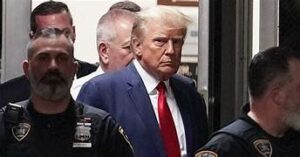Friday’s hearing centered on a protective order requested by prosecutors that would set rules about what information Trump or his attorneys could share publicly before the government turns over discovery materials. Citing Trump’s “statements on social media regarding witnesses, judges, attorneys, and others associated with legal matters pending against him” — particularly a Truth Social post that said, “IF YOU GO AFTER ME, I’M COMING AFTER YOU!” — Smith’s office said sharing, for example, grand jury transcripts “could have a harmful chilling effect on witnesses or adversely affect the fair administration of justice in this case.”
Trump’s team has argued that the government was seeking “to restrict First Amendment rights,” though, as a matter of common practice, criminal defendants’ constitutional rights are routinely restricted. Trump’s lawyers argued that Smith’s office “requests the Court assume the role of censor and impose content-based regulations on President Trump’s political speech.”
In Friday’s hearing, Lauro noted the uniqueness of a case involving a former president and current candidate for president brought by the administration of his likely general election opponent, President Joe Biden. “We have to face the fact that we’re in uncharted waters here. … His opponent has the Justice Department bringing criminal charges against him,” Lauro said.
Lauro argued that the government’s proposed protective order would be beneficial to the Biden campaign because it would stifle Trump’s political speech.
Chutkan rejected the political argument. “This is a criminal trial. … I cannot and I will not factor into my decisions the effect it’s going to have on a political campaign for either side,” she said.

“I intend to ensure that your client is afforded all the rights he’s entitled to. The existence of a political campaign is not going to have any bearing on my decision,” she said, later adding: “I intend to keep politics out of this.”
Thomas Windom, a prosecutor for Smith’s office, argued that a protective order is needed to protect witnesses and “prevent the use of any material produced in discovery from harming the jury pool.”
The defense is “asking for the court’s blessing to use criminal discovery for political purposes,” he said.
Chutkan reiterated that she has to weigh Trump’s First Amendment rights to speech, noting that Trump is already bound by his conditions of release from harassing or intimidating witnesses.
After a discussion about Trump possibly posting discovery materials online, she ruled that witness interview transcripts will be considered sensitive materials subject to the protective order.
“Your client’s defense is supposed to happen in this courtroom, not on the internet. And to the extent your client wants to make statements on the internet, they always have to yield to witness security and witness safety,” Chutkan told Lauro.
Lauro assured her that “President Trump will scrupulously abide by his conditions of release,” which includes not doing anything that could be construed as harassing or intimidating witnesses.
Lauro argued that because of Trump’s campaign, he might need to address witness testimony. Former Vice President Mike Pence, who is running against Trump in 2024, testified before the special counsel grand jury in April.
“He is a criminal defendant,” Chutkan said of Trump. “He is going to have restrictions like every other defendant.”
She said the protective order will require defense attorneys to review any notes Trump takes while looking at sensitive materials to make sure they don’t contain any witness’s personal identifying information. Trump will also be forbidden from having a phone, copy machine or anything else that could create a copy of the sensitive materials while reviewing them.
“He has shown a tendency to hold on to material which he should not,” Windom said.
The trial is still many months away. Smith’s team proposed Thursday that jury selection start in December and that a trial get underway just after the new year.
A Jan. 2 trial date, his team wrote, “would vindicate the public’s strong interest in a speedy trial — an interest guaranteed by the Constitution and federal law in all cases, but of particular significance here, where the defendant, a former president, is charged with conspiring to overturn the legitimate results of the 2020 presidential election, obstruct the certification of the election results, and discount citizens’ legitimate votes.”
Trump’s team has not yet filed its response for a trial date. Windom said Friday that the government is prepared to turn over 11.6 million pages of discovery in its first production, as well as a hard drive containing extractions from various devices.

“I can just imagine your motion for a trial date now,” Chutkan joked to Lauro.
She ended the hearing with a warning to Trump’s team “to take special care about your public statements about this case.”
“Even arguably ambiguous statements by the parties or their counsel, if they could be reasonably interpreted to intimidate witnesses or to prejudice potential jurors, can threaten the process,” Chutkan continued.
The more a party makes public statements that could influence potential jurors, she said, the more quickly the case will proceed to trial.










